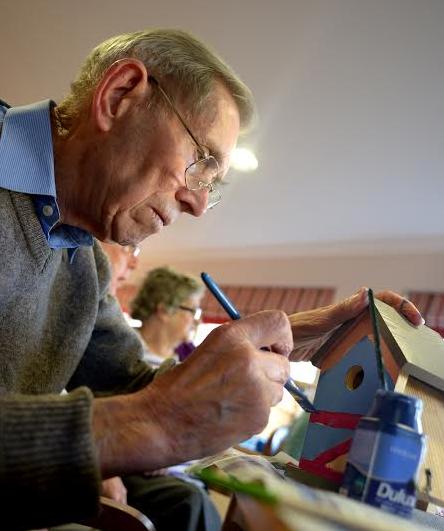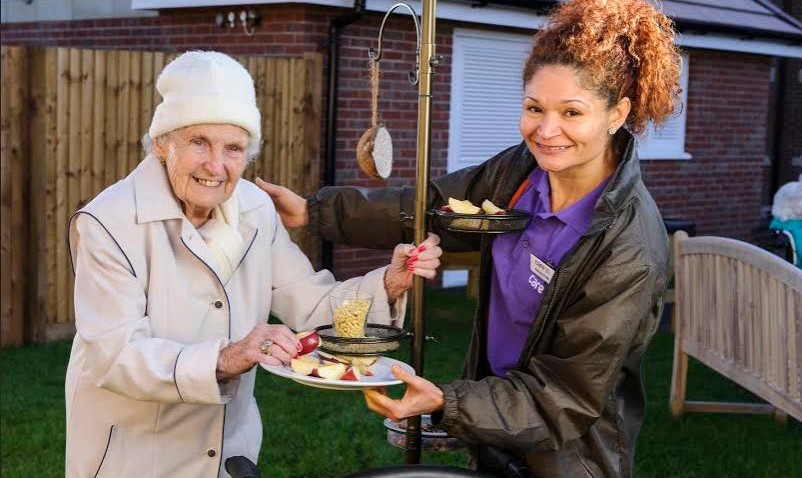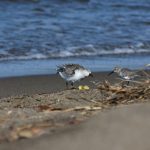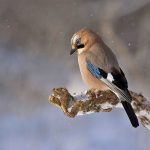Residents and care teams at several of Care UK’s homes have their binoculars at the ready and their bird feeders filled as they prepare to take part in the RSPB Big Garden Birdwatch this weekend
Known as the largest wildlife survey in the world, the RSPB Big Garden Birdwatch encourages people throughout the UK to take a closer look at the nature on their doorsteps by counting the different birds which visit their garden in any one hour over the last weekend of January, as well as recording any non-bird species of wildlife such as badgers and hedgehogs.
Pyela Mwale, home manager at Scarlet House in Stroud explained why the home team is one of many Care UK homes taking part in this year’s RSPB Big Garden Birdwatch. “Connecting with our outdoor space and taking the time to observe birds and wildlife can be extremely beneficial for residents, particularly for those who are living with dementia. “
 “The quiet, calming nature of bird watching can help lower anxiety, while the colourful sights and distinctive sounds of our feathered friends provide plenty of sensory stimulation. Bird watching can also be a valuable reminiscence activity, with the appearance of certain species and the sounds of bird song evoking memories and it also helps residents recall their love of nature.”
“The quiet, calming nature of bird watching can help lower anxiety, while the colourful sights and distinctive sounds of our feathered friends provide plenty of sensory stimulation. Bird watching can also be a valuable reminiscence activity, with the appearance of certain species and the sounds of bird song evoking memories and it also helps residents recall their love of nature.”
She added: “Sitting and watching the birds come and go quickly becomes an enjoyable shared interest for residents which can help combat any feelings of isolation, while practical tasks such as helping to clean and fill bird feeders can also be very fulfilling.”
As well as providing feeders and seed, Care UK teams in the homes are also making use of a bespoke CD of British bird songs and a booklet designed to help care home teams run reminiscence sessions with residents – including those living with dementia. The recordings of the songs were donated by Malcolm Clark from Suffolk who has spent three decades capturing the songs of local birds. The booklet was devised by colleagues with an interest in wildlife and helping people with dementia and has been re-launched this month in a new format.
Commenting on the booklet and CD, Care UK’s head of dementia Maizie Mears-Owen said: “There is a growing band of evidence about the therapeutic effect of birdsong so, as well as helping to promote wellbeing amongst people living with dementia, it provides a great opportunities for quizzes and reminiscence activities that is fun, stimulating and doesn’t require my colleagues to have a detailed knowledge of birds to run them.”
Family carers can receive advice and support on how to incorporate practical activities such as bird watching into their daily routines by visiting careuk.com and requesting or downloading copies of Care UK’s two free guides: ‘As Easy as ABC’ – a guide to activity based care – and ‘Listen, Talk, Connect’ – which helps overcome the challenges of connecting and communicating with loved ones who are living with dementia.
To find out which Care UK homes are taking part in the RSPB Big Garden Birdwatch, visit www.careuk.com/birds
The RSPB Big Garden Birdwatch has taken place annually over the last 35 years, with the information collected each year helping the RSPB form a picture of bird populations across the country and highlighting any trends or changes. For more information, visit www.rspb.org.uk





